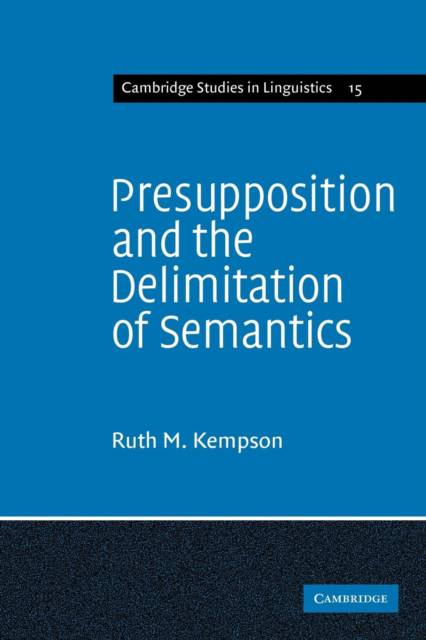
Door een staking bij bpost kan je online bestelling op dit moment iets langer onderweg zijn dan voorzien. Dringend iets nodig? Onze winkels ontvangen jou met open armen!
- Afhalen na 1 uur in een winkel met voorraad
- Gratis thuislevering in België vanaf € 30
- Ruim aanbod met 7 miljoen producten
Door een staking bij bpost kan je online bestelling op dit moment iets langer onderweg zijn dan voorzien. Dringend iets nodig? Onze winkels ontvangen jou met open armen!
- Afhalen na 1 uur in een winkel met voorraad
- Gratis thuislevering in België vanaf € 30
- Ruim aanbod met 7 miljoen producten
Zoeken
€ 60,95
+ 121 punten
Omschrijving
In this book, first published in 1975, Dr Kempson argues that previous work on presupposition - whether in philosophy or linguistics - has been mistakenly based on a conflation of two different disciplines: semantics, the study of the meanings assigned to the formal system which constitutes a language, and pragmatics, the study of the use of that system in communication. The first part of the book deals generally with the nature of semantics in linguistic theory and its formal representation within a transformational grammar; Dr Kempson argues against incorporating the relation of presupposition within such a grammar. The second part provides a pragmatic account of the foundations of a theory of communication and its detailed application to the problems raised by presupposition. The book is intended for those studying both philosophy and linguistics and also for those sociolinguists and psychologists with a more general interest in the theory of communication.
Specificaties
Betrokkenen
- Auteur(s):
- Uitgeverij:
Inhoud
- Aantal bladzijden:
- 248
- Taal:
- Engels
- Reeks:
- Reeksnummer:
- nr. 15
Eigenschappen
- Productcode (EAN):
- 9780521099387
- Verschijningsdatum:
- 25/07/1975
- Uitvoering:
- Paperback
- Formaat:
- Trade paperback (VS)
- Afmetingen:
- 152 mm x 229 mm
- Gewicht:
- 367 g

Alleen bij Standaard Boekhandel
+ 121 punten op je klantenkaart van Standaard Boekhandel
Beoordelingen
We publiceren alleen reviews die voldoen aan de voorwaarden voor reviews. Bekijk onze voorwaarden voor reviews.











